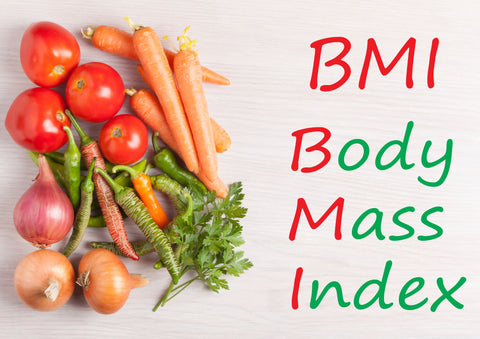Top 10 Health Benefits of BMI (Body Mass Index) Calculator for Men & Women
Posted by Joel Williams on
WHAT IS BMI?
BMI, or Body Mass Index, is a numerical measure used to assess an individual's body weight in relation to their height. It is a simple and widely accepted tool for categorizing adults into different weight categories, helping to identify potential health risks associated with weight.
It provides a general indication of whether an individual is within a healthy weight range or at risk of weight-related health problems. However, it has limitations, such as not accounting for muscle mass or body composition.
Therefore, it should be used as part of a broader health assessment and consult with a healthcare professional for a more comprehensive understanding of your health status.
Please scroll down the page to the BMI Calculator to find all the values for adults from underweight to overweight.
BENEFITS OF USING A BMI CALCULATOR
Using a BMI (Body Mass Index) calculator is a valuable tool for individuals, healthcare professionals, and researchers alike.
BMI is a numerical representation of an individual's body weight in relation to their height, and while it has its limitations, it offers several benefits when used as part of a broader health assessment toolkit. In this article, we will delve into the ten benefits of using BMI for men and women, backed by scientific research and studies from reputable universities and institutions.
-
QUICK AND SIMPLE WEIGHT ASSESSMENT
When you calculate your BMI it provides a quick and straightforward method for assessing an individual's weight status based on their height and weight.
According to the World Health Organization (WHO), BMI is a widely accepted measure for assessing overweight and obesity in adults and is a useful screening tool for identifying weight-related health risks. This simplicity makes it accessible to a wide range of people, from healthcare providers to individuals seeking self-assessment.
-
HEALTH AWARENESS AND EDUCATION
Using a BMI scale can raise awareness about the importance of maintaining a healthy weight. 
Research from Harvard University emphasizes the role of BMI in educating individuals about the significance of weight management for overall health. This awareness can lead to informed decisions about lifestyle choices, including diet and exercise.
-
IDENTIFYING HEALTH RISKS
These calculators can indicate potential health risks associated with being underweight, overweight, or obese. The Centers for Disease Control and Prevention (CDC) highlights the association between higher Body mass index values and increased risk of chronic conditions, such as heart problems, diabetes, and certain cancers. Recognizing these risks is a crucial step in avoiding these diseases and management.
-
GOAL SETTING AND MOTIVATION
One of the benefits of using this valuable tool is that it provides a baseline measurement for individuals to set specific weight-related goals.
Research published in the American Journal of Clinical Nutrition emphasizes the importance of setting realistic weight goals, and BMI can serve as a starting point for these objectives. Whether the goal is weight loss, maintenance, or muscle gain, having a numerical reference can be motivating.
-
TRACKING PROGRESS
Regularly calculating and recording BMI values helps individuals to track their progress and improve their scores. The National Institutes of Health (NIH) recommends monitoring changes in these body mass values as part of a comprehensive weight management strategy.
Tracking progress can help individuals stay on course and make necessary adjustments to their health and fitness routines.
-
HELPS TO FACILITATE DOCTOR-PATIENT COMMUNICATION
BMI provides a common metric that doctors and patients can use to discuss weight-related concerns and treatment plans. Research from the NIH, highlights the role of this in improving communication between healthcare providers and patients when discussing weight management strategies.
Effective communication is essential for developing personalized and effective healthcare plans.
-
PREVENT PROBLEMS FROM OCCURRING THROUGH AWARENESS
BMI calculation can motivate individuals to take proactive steps to prevent weight-related health issues. The American Heart Association emphasizes the importance of recognizing risk factors and adopting a heart-healthy lifestyle, and BMI is a key factor in assessing these risks.
Preventative measures include healthier eating, regular physical activity, and routine medical check-ups.
-
VALUABLE DATA FOR RESEARCH
On a broader scale, BMI data is a valuable resource for healthcare research and policy-making. Universities and institutions worldwide conduct studies using BMI data to understand trends in weight-related health issues and develop public health strategies. The National Cancer Institute, for example, utilizes BMI data in cancer research and prevention efforts.
-
CAN HELP THE PUBLIC WITH HEALTH AWARENESS CAMPAIGNS
These calculators can be incorporated into public health campaigns to raise awareness about the importance of maintaining a healthy weight at the population level.
The CDC cites the use of BMI in public health initiatives aimed at reducing the prevalence of obesity and related health conditions. These campaigns aim to promote healthier lifestyles and reduce the burden of obesity-related diseases.
-
EARLY INTERVENTION AND TREATMENT CAN SAVE MORE LIVES
Lastly, BMI calculators play a crucial role in early intervention and treatment. Early detection of weight-related issues through BMI assessment can lead to timely interventions and treatment plans.
Research from the University of Michigan highlights the importance of early intervention in managing childhood obesity, emphasizing the role of BMI measurements. 
BMI Calculator - How To Calculate
BMI is calculated by dividing a person's weight in kilograms by the square of their height in meters. The formula is:BMI = weight (kg) / (height (m) * height (m))
What is My BMI?
The resulting number represents an individual's BMI value, which falls into one of several categories:- Underweight (BMI < 18.5)
- Normal weight (BMI 18.5 - 24.9)
- Overweight (BMI 25 - 29.9)
- Obesity Class I (BMI 30 - 34.9)
- Obesity Class II (BMI 35 - 39.9)
- Obesity Class III (BMI ≥ 40)
Free BMI Calculator:
(When entering your height in feet and inches below Do Not put the parenthesis around these numbers - just the numbers.)
FAQ FOR BMI
1. Why does my BMI say I'm overweight when I'm not?
One of the biggest problems with Body Mass Index is that it does not factor in a person's body fat versus lean muscle content. Although muscle weighs the same as body fat one pound of fat weighs the same as one pound of muscle. However, this same pound of muscle will be about 18% smaller than a pound of fat!
2. Is age a factor in calculating BMI?
Is age a factor in calculating BMI? For adults, regardless of whether you're male or female, age doesn't come into play. However, when it comes to children and adolescents, age and gender do influence the results.
3. How can I lower my BMI from 35 to 25?
By following a calorie-deficit diet or intermittent fasting, you can help reduce your overall body fat levels and thus, lower your BMI level.
Even small changes can add up over the long run, as long as you're consistent. Exercise generally boosts your metabolism, which in turn, burns calories and causes weight loss.
SOURCE:
northhoustonclinic.com
https://www.northhoustonclinic.com/how-to-lower-bmi-5-medically-proven-ways-to-lose-weight/
4. What foods lower your BMI? 
- Whole grains (whole wheat, steel-cut oats, brown rice, quinoa)
- Vegetables (a colorful variety-not potatoes)
- Whole fruits (not fruit juices)
- Nuts, seeds, beans, and other healthful sources of protein (fish and poultry)
- Plant oils (olive and other vegetable oils)
SOURCE:
harvard.edu
https://www.hsph.harvard.edu/obesity-prevention-source/
5. What is the fastest way to lower your BMI?
It's no secret that the more you exercise, the more you can lower your BMI, healthily. 
NHS recommends doing at least 150 minutes of moderate-intensity exercise a week (for example a brisk walk, hiking, or cycling), or 75 minutes of vigorous intensity.
SOURCE:
livi.co.uk
6. Does drinking water lower BMI?
A study conducted in 2014* involved 50 overweight females who added 500 milliliters (mL) of water to their daily routine, consuming it 30 minutes prior to breakfast, lunch, and dinner for eight weeks, alongside their regular water intake. The result? These participants noticed a decrease in body weight, body fat, and their body mass index.
SOURCE:
medicalnewstoday.com
https://www.medicalnewstoday.com
In conclusion, BMI calculators offer several benefits in assessing weight status, raising health awareness, identifying risks, setting goals, tracking progress, facilitating communication, promoting prevention, supporting research, advancing public health, and enabling early intervention.
While BMI is a valuable tool, it should be used in conjunction with other health assessments and under the guidance of healthcare professionals for a comprehensive understanding of one's health status.
Share this post
- Tags: BMI, BMI Calculator, Body Mass Index, Overweight



